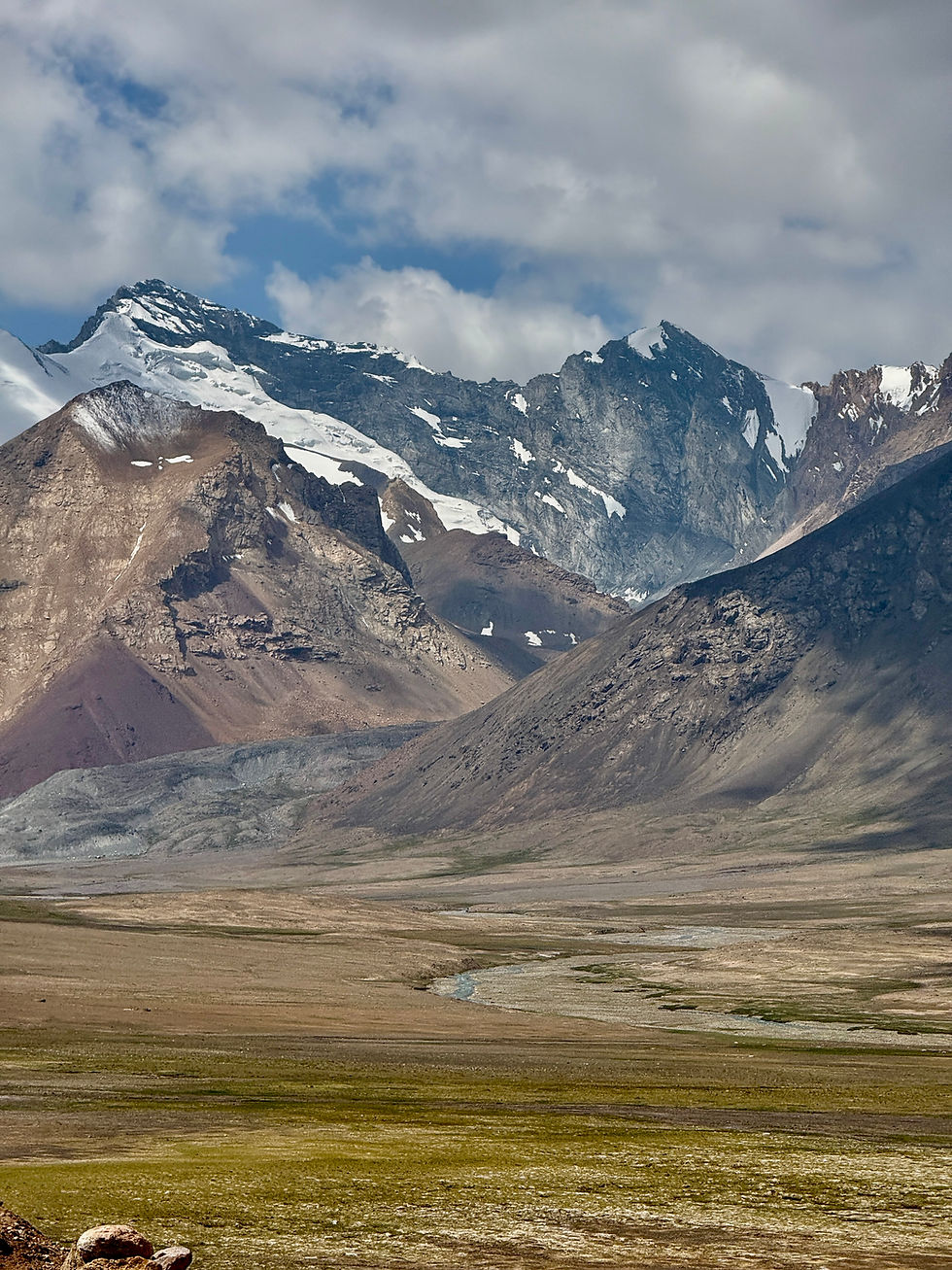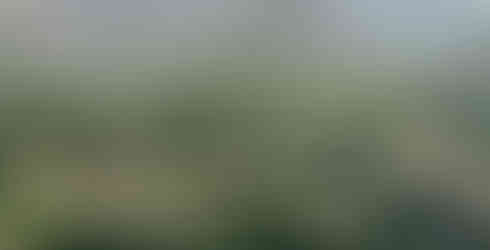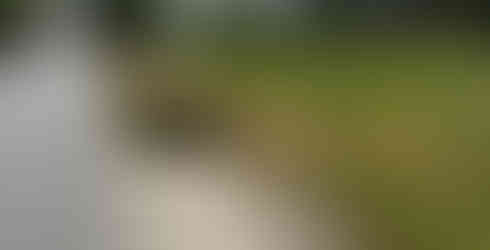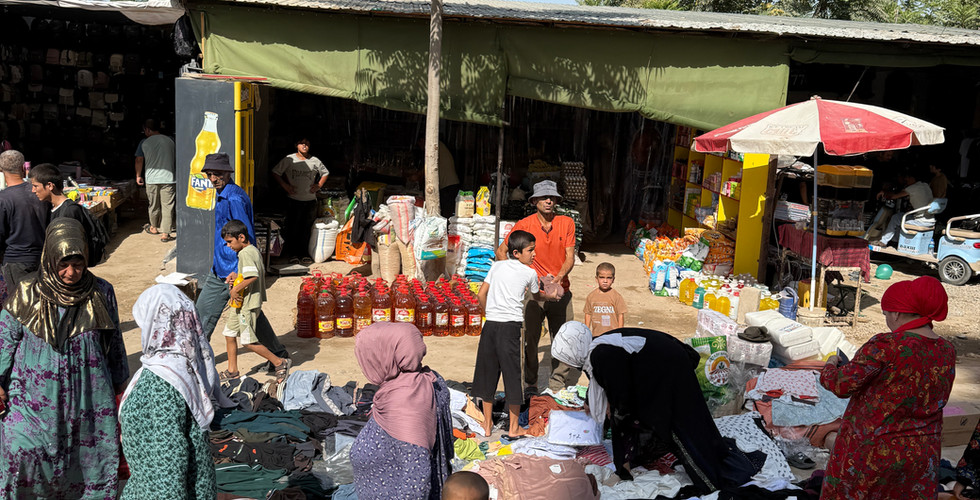Tajikistan - On the roof of the world.
- David Stephenson
- Sep 30, 2025
- 5 min read
Updated: Jan 8

“The mountains are calling, and I must go.” — John Muir
A Border Miracle
The Tajikistan border was simple compared to others. We completed the usual truck inspections and stamped the papers, and we were through. I wanted to ask the guards to take their boots off before entering our truck habitation box, to inspect for contraband, as we do, but thought better of it. We completed all the formalities in an hour, which has to be a record, as many borders take many hours of stamping papers, paying bills, and generally being delayed.
The Pamir Highway Beckons
Crossing into Tajikistan, the difference was immediate. The country is made up of ninety per cent mountains, the roads are corrugated, which shook us to bits, but we are used to that and driving that felt like a crawl because of the further broken roads to add to the corrugated stretches. But the air cooled, and with it came a sense of relief. After weeks of heat, our brains could finally start working again. Well, as much as they are able at our ages!

The Pamir Highway is breathtaking - once part of the Silk Road, it still feels like the “roof of the world” - remote, exposed, and shaped by centuries of traders and travellers who passed this same way, long before diesel engines sputtered at altitude along its path.
The air cooled quickly. Life got easier; we could think again. Valleys opened, waterfalls cut across the road, rock faces closed in - brutal and beautiful at once. We felt our souls return.

Broken or corrugated roads in the mountains.
Life at Altitude
Back in the truck, reality struck: we hadn’t touched preventative maintenance in the heat, and the water filter was overdue for a clean. We have a simple candle-type filter that allegedly cleans all water of impurities apart from metals and makes any water fit for us to drink. That is, if you clean it regularly.
I opened it up to find the candle filter caked in brown sludge, and the housing was no better.
No wonder we’d been ill. If the sludge didn’t kill us, the smell might have. Another lesson learnt.

We climbed to 4,500 metres, and everything changed. I had a constant headache; Charlotte couldn’t lie down without gasping for breath.
Even our sealed plastic bottles of sauces and cleaning products, all expanded, one cleaning product blew its top and deposited the contents of some acidic fluid all over the worktops in the truck. Bought somewhere along the road and way too toxic to be sold in the Western world. It etched marks into our stone countertops, completely ruining them. Not the best of looks and a permanent reminder to take more care.
The truck suffered too. At that altitude, gas wouldn’t burn properly, so tea-making became a lengthy undertaking. Worse, the engine refused to start in the mornings. One night, we set alarms every three hours to fire it up, just to keep the diesel from solidifying.
At 4,500 metres, the truck took more convincing than I did to get moving.
Fresh food soon vanished and wasn't available to replenish, so pasta became our new best friend. After a week of improvising sauces, I reckon we’re Michelin-starred in pasta monotony.

Villages on the Edge
Filling the water tanks was a chore too; it meant pulling into villages where the only supply was hand-pumped water from a well. We watched a man ahead of us come from his home to draw two buckets of water for his family while our “swanky” overland truck sat behind him, leaving us feeling guilty at the contrast in our two worlds.
Cow dung was burned for heat because there was nothing else. Trees didn’t grow and survive at this altitude and with such harsh conditions. The local houses were made from bricks hand-formed out of mud and straw.
Life at 4,000+ metres was survival stripped bare.
Getting water is not easy when you can't turn on the tap.
At one roadside stop for diesel, I gestured clumsily to a husband-and-wife team holding their baby that we wanted diesel.
The wife first spoke Russian. I bellowed back that I only spoke English, and she replied, in perfect English: “How much diesel do you want?” We laughed, but when we chatted, obviously, the weather was on my mind, and the lady explained winters hit minus 50°C, the smile dropped. Their resilience dwarfed our struggles.
The diesel was initially pumped into a Jerry can from a large tank where they had stored the diesel.
They didn’t have electricity or a gauge to tell how much diesel we had, and so it was measured by the Jerry can, 20 litres at a time. That’s a lot of diesel when you want 300+ litres.
Filling with diesel, 20 litres at a time.
Parallel Worlds Along the Panj
Descending from the Pamirs, we drove for days along the Panj River. Afghanistan sat just across the water - so close we could see men in long gowns, women covered head to toe in 40°C heat, and children splashing in the river. The memory stuck. Parallel worlds, separated only by the river.
The Afghan side had calm domestic scenes; the Tajik side had army patrols, bunkers, and soldiers checking our papers.

One morning, at dawn, after we had camped by the river, looking into Afghanistan over the river, soldiers came to our truck, hammering on the door, demanding we open up. We got scared. What had we done wrong?
Their reason for the early morning visit, a warning for us, never to camp so close to the river again. They told us the Afghans were terrible people and that it wasn’t safe. They could come over the river in the darkness and do to us …….., the soldiers never did explain?
It felt the opposite - the families across the river looked more at peace than the soldiers who scowled at us from our own side.
We will never know the truth, I guess?
Looking over the river into the parallel world of Afghanistan.
Khaki Clad Tourists & Pushbike Heroes
The Pamir Highway is a magnet for travellers of all shapes and sizes. Cyclists pedalled past, barely acknowledging us, probably thinking we were mad for dragging a truck through their terrain, whilst we thought the same of them.
Convoys of westerners in 4x4s rattled by, dressed in safari khaki as if filming a wildlife documentary - though the only wildlife around was a few confused cows.
People do the strangest things.

We have had worse parkups.

A guard post on the Pemir highway.
We felt equally cynical about them as they likely felt about us. We are paddling our own canoe whilst others are driven at speed between luxury resorts and are fed on an array of western buffet food at night.
But the truth is, every traveller chooses their own hardship - be it pedals, aircon, or diesel alarms at 3 am.
Visitors are always welcome.
Villages and markets as we descended from the Pamir highway.
Perspective at Altitude
At 4,500 metres, everything expands - bottles, engines, tempers, even doubts about what we’re doing. But what expanded most was perspective. Watching villagers haul water, burning dung to stay warm, or children laughing in Afghanistan while soldiers scowled on our side of the river - it all pressed the same truth: the Pamirs test not just your truck or your lungs, but how you measure yourself against others who endure with far less.
Bring on the next challenge.
Thanks for reading, we hope you enjoyed it - if you haven't already, consider subscribing for updates on new blog releases.
....and if you want an insight into where we are and we we are doing in between blogs do check us out on Facebook.


























































































Wow what an experience, you both are so brave. My husband had the same symptoms when we skied in Sierra Nevada. Great blog and photos, look forward to your next blog. Look after one another and stay safe 👍
Truly amazing……so grateful you are sharing this extraordinary journey with us all. Venturing into ‘other worlds’ we are never likely to experience.
Thanks guys. Great Blog as ever. You make it seem a small world. Xx
Another amazing read. I really can’t believe that you’re doing this, you’re so much braver than me but it’s an experience that most people will never have and definitely one you’ll never forget. Take care. Looking forward to the next instalment xx
Blimey mate, you're a tough pair of buggers. I admire your resilience. As testing as some of your experiences have been, you can both look back on something that most of us will never know. Nobody can take that from you. Good on you, both. Mick & Lisa xx